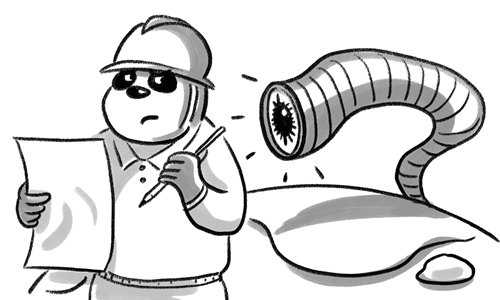
Illustration: Liu Rui/GT
The Australian, the biggest media outlet in Australia, recently reported that China is negotiating to fund the redevelopment of a coral-choked port in Samoa. The article was apprehensive that Chinese access to the port may lead to a military base. Military officials, analysts and scholars from the US and Australia warned that the port could lead to a "salient right through the heart" of American, Japanese and Australian defenses in the South Pacific or threaten Australia's east coast trade routes to the US, potentially putting Australia under pressure and projecting power to the north up to Micronesia, Guam and even Hawaii.
The report is another instance of hyping up the "China threat" theory that has been long played up by Australia and other countries which are former colonizers of the South Pacific region. But anyone with common sense will not believe that China has the capability or the need to militarily threaten a more powerful alliance of Australia, Japan and the United States, especially in a faraway place. Media outlets from these countries hype up the "China threat" theory repeatedly, periodically and intentionally due to the following three reasons:
First, these media outlets are part of interest groups. Exaggerating the threat from China will help the US and its allies, who behind the scene, obtain more benefits. After the end of the Cold War, these countries have increased their military expenditure instead of reducing it. The "China threat" theory is exploited by their governments and military establishment as a ruse to explain the increased defense spending to the public.
Second, hyping up the "China threat" theory is the simplest and the most morally deceptive method to demonize China's assistance and infrastructure building activity in other developing countries. The assistance that China offers to Pacific island nations and other regions is always widely welcomed because it comes with no political strings attached. For example, Pacific countries and their citizens usually refuse assistance from countries tagging it with political riders. It is China that broke the aid monopoly of Western countries which deprives them of the political privileges and vested interests they were so used to enjoying in the Pacific region. In return, these Western countries try to use public discourse as propaganda to parade the "China threat" theory to skew opinion against Beijing in the South Pacific. However, their plan is not going to succeed.
Finally, a bogey of "China threat" is created to prevent Beijing from constructing military bases in the Pacific Ocean. According to some Western journalists, there is neither solid evidence nor an iota of credibility to the claim that China is militarily threatening Pacific island nations. The purpose of repeating the same claim is to prevent China from setting up a military base in the Pacific islands. Beijing builds its foreign relations on a foundation of peace and amity. It is futile for media outlets to keep targeting China as their understanding of "big power" has long become obsolete.
The author is a chief research fellow at the Research Center for Pacific Island Countries, Liaocheng University and a research fellow at the Australian Studies Center at Beijing Foreign Studies University. opinion@globaltimes.com.cn